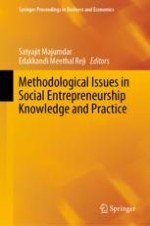2020 | OriginalPaper | Chapter
13. Practicing Ethnography in a Social Enterprise: Developing an Internal Critique
Authors : Kishore Bhirdikar, Samapti Guha
Published in: Methodological Issues in Social Entrepreneurship Knowledge and Practice
Publisher: Springer Singapore
Activate our intelligent search to find suitable subject content or patents.
Select sections of text to find matching patents with Artificial Intelligence. powered by
Select sections of text to find additional relevant content using AI-assisted search. powered by
